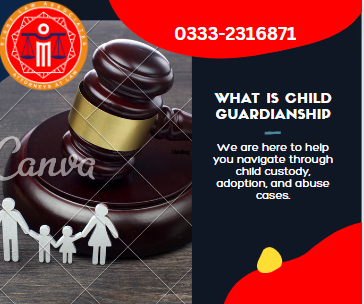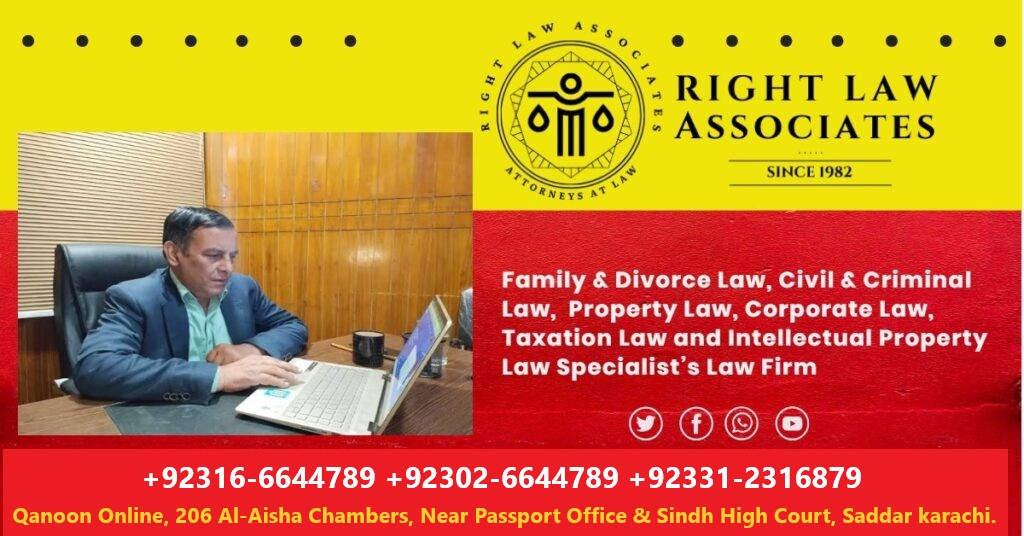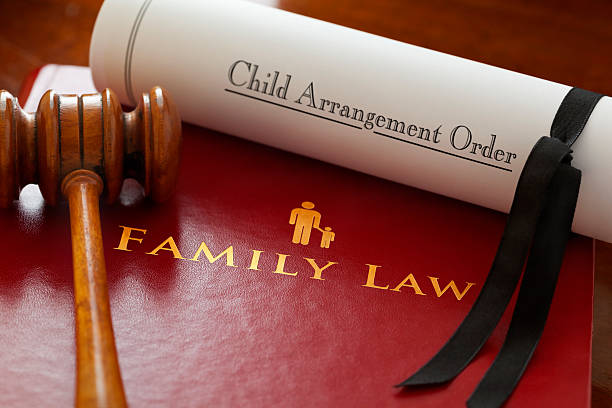- Karachi
- Lahore
- Islamabad
- Leads, UK
- Reading, UK
- Quebec, Canada
What is Child Guardianship
Understanding the Concept of Child Guardianship
Child guardianship is a legal concept that involves the appointment of a responsible individual or entity to act as the guardian and caretaker of a minor child. This legal arrangement becomes necessary in various circumstances, such as parental incapacity, divorce, or the death of a parent. Understanding the fundamental aspects of child guardianship is crucial for ensuring the well-being and proper upbringing of the child.
Law Governing Child Guardianship
Guardianship of a child is a profound legal responsibility, encompassing various dimensions to ensure the well-being, safety, and proper development of minors. Rooted in a combination of Islamic principles and legislative statutes, notably the Guardians and Wards Act of 1890, the concept of guardianship delineates the roles and responsibilities of individuals entrusted with the care of a child.
Legal Foundations and Types of Guardianship
The legal foundation of guardianship in Pakistan is deeply embedded in both Islamic jurisprudence and statutory laws. Understanding the nuances of guardianship involves recognizing two primary types:

Physical Guardianship (Hizanat)
Physical guardianship entails determining the child’s residence and day-to-day care. This aspect is crucial for providing a stable and nurturing environment.
Legal Guardianship (Wilayat)
Legal guardianship bestows decision-making authority for the child’s upbringing, education, and overall development. This extends to choices affecting the child’s welfare and future.
Paramount Consideration: Child’s Best Interests
At the core of guardianship decisions lies the paramount consideration of the child’s best interests. Courts meticulously weigh factors such as safety, welfare, education, and the overall development of the child. This emphasis on the child’s well-being serves as a guiding principle in guardianship matters.
Harmony with Islamic Principles
Guided by Islamic principles, guardianship decisions align with Shariah compliance. This alignment extends to matters concerning the child’s religious upbringing, education, and moral development. The interplay between legal statutes and Islamic values creates a comprehensive framework for responsible guardianship.

Guardians and Wards Act, 1890: A Legislative Blueprint
The Guardians and Wards Act of 1890 stands as the legislative cornerstone, providing a detailed blueprint for the appointment of guardians and safeguarding the welfare of minor children. This act empowers courts to make informed decisions regarding guardianship matters, emphasizing the child’s best interests.
Judicial Discretion in Guardianship Matters
Courts exercise discretionary powers when adjudicating guardianship matters. Each case undergoes thorough scrutiny, considering factors such as the guardian’s capability, moral standing, financial capacity, and, most importantly, the child’s welfare. This discretionary approach ensures a nuanced evaluation tailored to the specific circumstances of each case.
Legal Protocols in Guardianship Disputes
Disputes related to guardianship involve specific legal protocols. These proceedings typically begin with the filing of petitions under the Guardians and Wards Act. Courts play a pivotal role in evaluating evidence, listening to the arguments of both parties and reaching decisions that align with the child’s best interests.
Advocacy for Mediation and Alternative Dispute Resolution
In guardianship matters, the legal system actively promotes mediation and alternative dispute resolution mechanisms. The goal is to foster amicable resolutions, reduce emotional impact—especially for the child—and encourage cooperative arrangements between disputing parties.
The fluidity of Guardianship Orders
Guardianship orders are not rigid but rather adaptable to changing circumstances. Courts may approve modifications prompted by evolving situations or when adjustments are deemed to align with the child’s best interests. Guardians can petition the court for modifications, ensuring the flexibility needed to cater to the evolving needs of the child.
International Considerations in Guardianship
In an era of increased global mobility, guardianship matters may extend beyond national borders. International aspects of guardianship are addressed under conventions such as The Hague Convention on the Civil Aspects of International Child Abduction. This framework provides a structured approach to resolving cross-border guardianship issues, emphasizing cooperation between nations.
Responsibilities of a Guardian
The responsibilities of a guardian encompass a spectrum of duties aimed at ensuring the holistic development of the child. These include:
Providing a Safe and Nurturing Environment:
Creating a stable and secure living environment for the child’s physical and emotional well-being.
Educational Decisions:
Making decisions regarding the child’s education, including school selection and educational goals.
Healthcare Choices:
Authorizing medical treatments and healthcare decisions for the child’s well-being.
Financial Management:
Managing the financial affairs of the child, including any inheritance or assets.
Moral and Religious Guidance:
Offering moral and religious guidance in alignment with the family’s cultural and religious values.
Legal Advocacy:
Advocating for the child’s legal rights and interests, including representing them in legal proceedings.
Challenges and Complexities in Guardianship
While guardianship is designed to ensure the best interests of the child, it comes with its own set of challenges and complexities. These may include:
Custody Disputes
Disputes between competing guardians or individuals seeking guardianship can arise, necessitating legal intervention.
Evolving Family Structures
Changes in family structures, such as remarriages or blended families, can introduce complexities in guardianship arrangements.
Cross-Border Considerations
International mobility and cross-border family scenarios may add layers of complexity to guardianship matters, requiring adherence to international conventions.

Legal Consultation and Expert Guidance
Navigating the intricate landscape of guardianship requires expert legal guidance. Consultation with a qualified family lawyer ensures a nuanced understanding of legal provisions, adherence to Islamic principles, and effective representation in legal proceedings.
Child Guardianship and Law
In conclusion, guardianship of a child is a multifaceted legal responsibility embedded in both legal statutes and Islamic principles. The interplay between the Guardians and Wards Act of 1890 and Shariah compliance creates a robust framework that prioritizes the child’s best interests. Navigating the challenges and responsibilities of guardianship requires a keen understanding of legal nuances and a commitment to providing a nurturing environment for the child’s growth and development. Seeking legal consultation from experienced family lawyers is essential for individuals undertaking the responsibilities of guardianship, ensuring compliance with legal standards, and securing the welfare of the child.
This comprehensive exploration provides an in-depth understanding of guardianship, combining legal aspects, responsibilities, and considerations associated with this vital role in a child’s life.
Client-Centric Approach of Our Top-rated Advocates for Family Law Matters
The client experience is paramount at Qanoon House, and our top-rated family law advocates exemplify this commitment through a client-centric approach. Beyond legal representation, they prioritize open communication, understanding, and empathy. By actively involving clients in their legal strategies and addressing their unique needs, our advocates build lasting relationships that extend far beyond the resolution of individual cases. At Qanoon House, our top-rated family law advocates are not just legal representatives; they are trusted allies dedicated to achieving the best possible outcomes for our clients in their family law matters.
Legal Services
- Divorce Law
- Child Custody
- Family Law
- Financial Law
- Civil Legalation
Syed mohsin Ali Shah
Phone : +92316-6644789
Let's Connect
- 0333-1127831
- [email protected]
- M-51, M-52, Muneer Mobile Mall, Near Perfume Chowk Jauhar Chowrangi, Block 17, Gulistan-e-Jauhar, Karachi, Pakistan.
- Suite No. 5, 2nd Floor, Laraib Centre, Mangla Road, Karachi Company, G-9 Markaz, Islamabad Pakistan
-
NADRA Divorce Certificate Services in Pakistan
-
NADRA Birth Certificate Services in Pakistan
-
Court Marriage with Full Privacy Assurance
-
Court Marriage for Couples Seeking Legal Union
-
Court Marriage in Pakistan: Court Marriage Process & Fees
-
Court Marriage: Confidential & Hassle-Free Solutions
-
Trend of Court Marriage in Pakistan: Court Marriage's Reasons
-
Court Marriage Services in Karachi, Lahore, Islamabad, and Rawalpindi
-
Understanding Court Marriage in Pakistan: A Guide to Court Marriage
-
Best Family: What Makes a Family Truly Great
-
Divorce Papers in Pakistan: Divorce Deed and NADRA Divorce Certificate
-
Court Marriage in Pakistan: Procedure and Fees
-
Court Marriage in Lahore: Our Court Marriage Service in Lahore
-
Nikah Khawan and Nikah Registrar Services in Karachi, Pakistan
-
Family Law in Pakistan-The Muslim Family Law Ordinance 1961
-
Understanding Online Nikah: The Crucial Roles of Nikah Khawan and Nikah Registrar
-
Nikah Khawan and Nikah Registrar Services in Pakistan
-
Lawyers Help for Court Marriage Procedure in Karachi
-
Online Marriage in Islam: Muslim Online Marriage
-
Court Marriage in Pakistan—Legal Procedure, Social Realities, and Support for Couples
-
Court Marriage, Online Marriage, and Nikah-Khawan Services in Islamabad & Rawalpindi
-
Online Marriage/Nikah | Online Marriage/Nikah Services In and From Pakistan
-
Nikah Khawan/Qazi Services and Fees in Karachi-Lahore-Islamabad/Rawalpindi-Faisalabad-Multan
-
Court Marriage Pakistan | Court Marriage Services-Process-Fees in Pakistan
-
Embracing Online Marriage Services Across Karachi, Lahore, Islamabad, and Rawalpindi, Pakistan
-
Family Law | Expert Divorce Lawyers For Khula/Talaq (Divorce) in Karachi, Islamabad/Rawalpindi & Lahore, Pakistan
-
Guardianship Lawyers in Karachi, Lahore, & Islamabad Pakistan
-
Child Custody Lawyers in Karachi, Lahore, & Islamabad-Pakistan
-
English Nikah Nama | English Nikah Nama Available in Karachi
-
Family Law | Expert Divorce Lawyers For Khula/Talaq (Divorce) in Karachi, Islamabad/Rawalpindi & Lahore, Pakistan
-
Nikah Nama Urdu/English Available in Karachi
-
Nadra Marriage Registration Service | Marriage Registration Certificate
-
Marriage Registration | Nadra Marriage Certificate-Karachi
-
Nikah Nama Services with Nikah Nama English & Urdu
-
Nikah Registration | Nikah Registration Services-Pakistan
-
What is Child Guardianship
-
Top Rated Advocates for Family Law Matters
-
B Form NADRA: Importance of B Form in Pakistan
-
Nadra B Form in Pakistan
-
Is Court Marriage Legal in Pakistan
-
Child Maintenance Advocates in Karachi
-
Consumer Rights Advocates in Karachi
-
Best Leady Lawyer Expertise as a Family Court Lawyer
-
Online Nikah Marriage In Pakistan
-
Business Corporate lawyers in Pakistan
-
Criminal Lawyers in Karachi | Lahore | Islamabad Rawalpindi | Pakistan
-
Understanding Business Law Corporate Lawyers Services in Pakistan
-
Online Marriage Technology in Modern
-
Court Marriage Professional Lawyers in Lahore
-
Court Marriage in Pakistan and Civil Marriage: Right Law Firm
-
Property Lawyers in Pakistan
-
Property Lawyers Expert in Pakistan
-
Minimum Wage in Pakistan
-
Property Disputes a Comprehensive Guide
-
Child Adoption Procedure & Services in Pakistan
-
Legally Valid Online Nikah, Your Love Story with Online Marriage
-
Online Nikah Excellence Pioneering Legally Sound Online Marriage
-
Court Marriage the Effortless Formality
-
Court Marriage in Pakistan-No.1 Court Marriage Service in Karachi
-
Navigating the Path to Legal Unions, Court Marriage in Pakistan
-
Court Marriage, Empowering Personal Choice and Freedom
-
Trusted Court Marriage Law Firm
-
Court Marriage a Journey Court Marriage in Pakistan
-
Power of Nikah Certificates
-
Nikah Certificates-Legality in Pakistan
-
Adoptions and Adoptive Families in Pakistan
-
Court Marriage in Pakistan A Comprehensive Guide
-
<strong>Tax Lawyer Mohsin Ali Shah</strong>
-
Civil Lawyers The Importance of Evidence in Civil Cases-Expert Tips for Civil Lawyers
-
Can There Be Objections to a Public Party Following a Court Marriage.
-
Court Marriage Making Love Officially Recognized Via Court Marriage
-
Court Marriage, Civil Marriage & Online Nikah in Pakistan
-
Misyar Marriage Nikah Misyar Facts About Misyar Marriages
-
Online Nikah and Online Marriage in Pakistan
-
The government of Pakistan amended the Civil and Criminal Law to bring reforms in Justice System
-
Child Adoption & Guardianship in Pakistan
-
Restitution of Conjugal Rights
-
Difference between Divorce Talaq and Khula:
